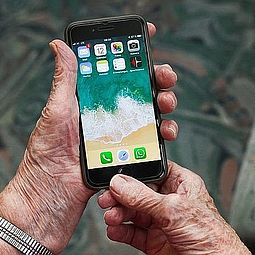Medical Minutes
June 9, 2012 at 1:30 a.m.
Daily Physical Activity May Reduce Alzheimer’s Disease Risk
Daily physical activity may reduce the risk of Alzheimer’s disease and cognitive decline, even in people over the age of 80, according to a new study. Researchers at Rush University in Chicago are now reporting that all physical activities including exercise as well as other activities such as cooking, washing the dishes, and cleaning are associated with a reduced risk of Alzheimer’s disease.
“These results provide support for efforts to encourage all types of physical activity even in very old adults who might not be able to participate in formal exercise, but can still benefit from a more active lifestyle,” said lead study author Dr. Aron S. Buchman, who is with Rush University.
To measure total daily exercise and non-exercise physical activity, researchers asked 716 older individuals without dementia with an average age of 82 to wear a device called an actigraph, which monitors activity, on their non-dominant wrist continuously for 10 days. All exercise and non-exercise physical activity was recorded. Study participants also were given annual cognitive tests during this ongoing study to measure memory and thinking abilities. Participants also self-reported their physical and social activities.
Over a mean of 3.5 years of follow-up, 71 participants developed Alzheimer’s disease. The research found that people in the bottom 10% of daily physical activity were more than twice as likely (2.3 times) to develop Alzheimer’s disease as people in the top 10% of daily activity. The study also showed that those individuals in the bottom 10% of intensity of physical activity were almost three times as likely to develop Alzheimer’s disease as people in the top percent of the intensity of physical activity.
Keeping Grandchildren Safe from Your Medication
Unintentional poisonings from medicines now cause more emergency room visits for young children each year than do car accidents. One key reason may be that nearly 1 of every 4 grandparents says that they store prescription medicines in easy-access ways, according to a new poll.
The University of Michigan Mott Children’s Hospital National Poll on Children’s Health recently asked parents and grandparents of children aged 1 to 5 years about the presence of medicines in their homes and how they are stored. The poll results showed 23% of grandparents and 5% of parents reported storing prescription medicine in easy-to-access places, including daily-dose boxes that children can open. In addition, 18% of grandparents and 8% of parents said they store over-the-counter medicines in easily accessible spots.
“Every 10 minutes a young child in the U.S. is taken to the emergency room because of possible poisoning from swallowing a prescription medicine or over-the-counter medicine,” said Dr. Matthew Davis, who is with the University of Michigan. “Emergency room visits for accidental poisonings among young children have become much more frequent in the last decade. We hope the results of this poll are a reminder to parents, grandparents and all those who care for young children (to) check around your homes to make sure that medicines are safely stored out of reach.”
The most common type of prescription in an accidental ingestion for young children is an opiate medicine, such as a morphine-related painkiller. The most common types of over-the-counter medicines that prompt emergency room visits for possible poisonings among young children include acetaminophen. To keep children safe, parents and grandparents are generally urged to keep medicine safely out of reach of young children, in child-proof containers.
John Schieszer is an award-winning national journalist and radio broadcaster of The Medical Minute. You can contact him at medicalminutes@gmail.com
This article appeared in the June 2012 issue of Northwest Prime Time, the Puget Sound region’s monthly publication celebrating life after 50.





